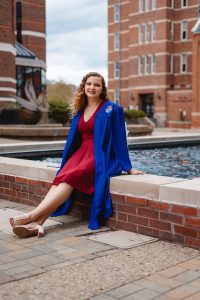Lessons from an SLP Graduate Student: Jessica Riley

Hi everyone! My name is Jessica Riley, and I am currently a second-year graduate student at Duquesne University in Pittsburgh, PA. Our program at Duquesne is a 5-year accelerated BS/MS program so it is a little bit different than most programs, but I think what I’ve learned will still apply to anyone in SLP grad school!
First off, it is so nice to not have to take random gen ed classes that have nothing to do with my major. Everything I’ve learned since starting grad school directly applies to our field and is much more interesting to me than when I took classes like physics.
Favorite and Least Favorite Class
It is so hard to pick a favorite class, but I really liked my motor speech disorders class because of our professor’s philosophy of teaching. Almost all of our lessons were about functional treatment instead of just memorizing the various types of dysarthria. I feel like I’m well prepared for the clinical world because of it. My least favorite class was probably anatomy and physiology for no other reason than I don’t like anatomy all that much!
Clinical Placements
Clinical wise, I did 3 semesters of clinical work in Duquesne’s outpatient clinic. Under the umbrella of the outpatient clinic, there are 6 specialty clinics for speech- language pathology. I had the privilege of working in the speech productions disorders, language, CAPD, and stuttering clinics. After that, we started clinical externship placements. Last semester I was at a nursing home which had rehab (SNF), long term care, and outpatient settings. This semester, I am at a special needs school.
Graduate Student Lessons Learned
Throughout grad school, the biggest thing I have struggled with is time management. We do our externships during the day and then have classes twice a week at night. It can be exhausting, as any grad student ever will tell you, but so worth it! I also struggled with balance because class doesn’t seem so important when you are already out doing what you are going to school for. However, it is important to know that there is ALWAYS something new to be learned. Even my professors learn new things from us when we talk about our clinical experiences. Going into grad school, I felt like I didn’t know anything at all. I worried that I wasn’t good enough. What this whole process has helped me understand is that you know more than you think. Just slow down, take a breath, and give yourself a moment to think.
I also want to touch on the importance of mental health. It is so easy to burn out or just want to shut yourself away because you are tired and stressed. DON’T DO IT! You are in grad school, not prison! It is OKAY to take a break sometimes, to go to a concert, go out to eat with friends. No one expects you to study all day, every day. I’d actually argue that studying all the time will actually be more harmful than helpful. That is not to say do not study at all but find a good balance.
The biggest thing I’ve learned so far is to try to make the most out of every experience. I’ve known for a long time it is my passion to work with children, so when I found out I was placed at a nursing home I was anxious. Even though that is not necessarily what I intend to do in our field, I still learned a lot about myself as a clinician and so many useful skills because I did not just write off the experience from the beginning. Another lesson I have learned is that you should always be thinking about how to work as a team with other professionals. In the nursing home, it was so nice to be able to collaborate with OT to talk about a client’s issues with feeding or be told by nursing staff what the patient’s mood was like that day. When everyone on the care team was on the same page, everything went so much smoother. This applies to nonmedical settings as well, with it being important in the to be in touch with the family, teacher, major doctors, etc. to stay updated on the client’s current condition. Lastly, I learned that it is okay to make a mistake. There is undoubtedly going to be a time where you say the wrong thing, ask a question twice, or score something wrong. Don’t be afraid to mess up. Everyone makes mistakes (as Hannah Montana so nicely sang) and no one expects you to be perfect. Just laugh it off and fake it till you make it. It is okay to be honest with people and say, “this is my first time doing this” or “I’m a bit nervous.” I’ve found people appreciate the honesty!
Final Thoughts
My last piece of advice to anyone reading this is if I can get through grad school, you can too! I’ll see all you budding speech- pathologists out in the real world!
If you have any questions or need anything at all, my email is jrileymd@gmail.com. Feel free to reach out and say hi!
Jessica Riley

